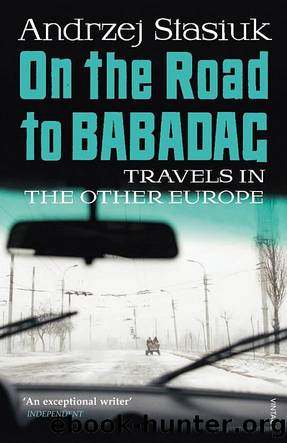On the Road to Babadag: Travels in the Other Europe by Andrzej Stasiuk

Author:Andrzej Stasiuk [Stasiuk, Andrzej]
Language: eng
Format: epub
Tags: Europe, Eastern, Travel, Former Soviet Republics, Essays & Travelogues, Road Travel, Western
ISBN: 9780099507147
Google: uoBJadOa758C
Publisher: Vintage
Published: 2012-07-05T00:00:00+00:00
We drove to the city of Soroca with W., who had business there. Soroca lies to the north of the Dniester, and beyond it is Ukraine. As you head north, the vineyards are gradually replaced by corn, which becomes omnipresent. We went to Soroca to meet Gypsies, who had a mini country of their own there.
Even from a distance, from the boulevard along the river, you could see it: on the hill above the city and down the steep bank to the Dniester, the Gypsy district. You could see that it was unlike anything else in Moldova. Tin roofs agleam in the sun like fish scales, looking like a Baroque-Byzantine-Tatar-Turkish encampmentâgood words, these. Roofs piled high, roofs bellied like wind-filled sails, roofs budding one from the other like living tissue. This from afar. Closer, it was a roller-coaster ride through centuries and continents. Victorian mansions, Mauritanian residences, Chinese pagodas, classic Greek facades, the Romanian Renaissance, and a reduced replica of the Bolshoi Theater in Moscow with three plastic steeds on top. Before a pavilion with twenty front windows, amid a green garden tangle, rose a six-meter fountain of white stone in an austere rococo style. At its base rested a crocodile, life-size and of the same material. Two Moldovans were finishing the monument, smoothing the last sharp edges, as Gypsy women watched, smoking cigarettes with holders of gold. I asked Robert who designed all this. Robert had a black-and-gold business card, owned a bakery, was building a mansion, had a BMW 700 with Slovak tags in his backyard, and was a kind of gray eminence in Soroca. "We did," he answered. "It's all from the imagination."
Robert also owned a pub. That is, it was jointly owned, but he was the main entrepreneur. We took seats on the veranda. In the center were tables, the bar, and ten computers. Kids sat at the computersâmostly Gypsies, with a couple of Moldovans. The dads could comfortably chat, drink, and keep an eye on their Internet-marauding progeny. We sipped cognac and ate watermelon. Robert said that times had changed and now one had to keep one's children off the street. But things were good otherwise: the borders were open, you could travel, do business, all you needed were a passport, ideas, and connections. You could go to the Chukchi, if you wanted, and sell them Chinese linens. No one would forbid you. It wasn't that bad before, but there were fewer possibilities then. That's what Robert said, over a cognac.
Artur arrived, and Robert invited him to join us. Artur was a kingâor baron. His business card read, in English: "Gypsy Baron of Moldova." He had a gray beard down to his belt, braided gray earlocks, and resembled a holy man of distant India. He was fully aware of that heredity and told us that the Nazis had collected the blood of their Gypsy victims, which held exceptional value for them because it was the purest Aryan blood. He said this without expression, entirely confident of our belief in what he said.
Download
This site does not store any files on its server. We only index and link to content provided by other sites. Please contact the content providers to delete copyright contents if any and email us, we'll remove relevant links or contents immediately.
Japan Eats! by Betty Reynolds(674)
Mr. Selden's Map of China by Timothy Brook(611)
The Hunt for Mount Everest by Craig Storti(596)
The Meaning of India by Raja Rao(538)
Philippines--Culture Smart! by Culture Smart!(509)
Food of India by unknow(501)
Ethiopia--Culture Smart! by Culture Smart!(485)
Rick Steves Germany by Rick Steves(485)
India--Culture Smart! by Becky Stephen(484)
North of South by Shiva Naipaul(465)
Bangkok Noir by Christopher G. Moore(460)
Cross Winds: Adventure and Entrepreneurship in the Russian Far East by Myers Steven(458)
Sake and the wines of Japan by Anthony Rose(434)
Lonely Planet's Ultimate Travel by Lonely Planet(434)
Ghana--Culture Smart! by Culture Smart!(428)
The Amur River by Colin Thubron(428)
Hill Railways of the Indian Subcontinent by Richard Wallace(401)
Florida by Lonely Planet(394)
Istanbul by Bettany Hughes(392)
